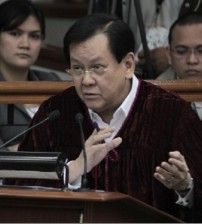
Senator Sergio Osmeña III. INQUIRER FILE PHOTO
MANILA, Philippines – Senators Serge Osmena III and Teofisto Guingona II defended President Benigno Aquino III’s refusal to sign a waiver on his bank accounts, saying this stems from his desire to keep his privacy.
“I don’t think [Aquino] is hiding anything. Jesus, he can have it deposited in his sister’s account, why will he put it in his account? A person really has an innate aversion to letting the world know what you are doing,” Osmena said.
He added that Aquino’s refusal was understandable. “Yes, I guess because the guy wants to be private naman [also]. You are looking into his lovelife, you are looking into his car life, you are looking into his gun life, the guy has no more privacy,” Osmeña said.
Guingona echoed the statement, saying that it is really up to Aquino to decide whether he will make public his bank accounts.
“I guess that’s really up to him because that’s his level of privacy that he wants to maintain,” Guingona told reporters.
When reminded that it was Aquino himself who promised that he would waive his account’s confidentiality under the country’s banking laws if elected President, Osmeña said: “You know naman [also] political promises are made to be broken, once in a while, not all the time but once in a while. Pagbigyan naman natin si Noynoy [Let’s give Noyonoy a chance],” calling the President by his nickname.
Senator Teofisto Guingona III. INQUIRER file photo
Meanwhile, Guingona said that he was personally willing to sign a waiver on his bank deposits.
“Personally, yes, why not? I would not have any problem there,” Guingona said.
Osmeña said other countries followed a standard in transparency in government. In the United States, Osmeña said, the Internal Revenue Service may look into a person’s account if it receives a court order but the court is not required to inform the depositor.
He added that making the president sign the waiver was “going too far” and that it was only in the Philippines that government officials were currently being asked to waive the confidentiality on their bank accounts, which then Chief Justice Renato Corona had asked from all government officials during his impeachment trial before the Senate, acting as an impeachment court.
Corona himself was convicted of violating the Constitution when he failed to disclose his statement of assets, liabilities and networth.
“That’s going too far, because you know even in other countries, does not do that,” Osmeña said.
Osmeña said that this issue on waivers may put to bad light those who refuse to sign even if they have nothing to hide since the public may immediately assume that they were hiding something.
“He may not be hiding something, he might just be a very private person, he doesn’t want his kids subjected to kidnapping, etcetera or black mail,” Osmeña said.
However, Osmeña said that there were double standards in the government since Corona, during the trial, was egged into finally signing a waiver. He said that if an official signs a waiver opening his accounts, it should be the courts that would look into it and the contents should not be made public.
“Leave it to the courts. Sa korte [In court], yes you can look at mine but don’t tell the world that I only have P5 in my account. Nakakahiya naman yun [It’s embarrassing]. And this is human nature, if I look at your bank account, sisipa ka rin [you will also object],” Osmeña said.